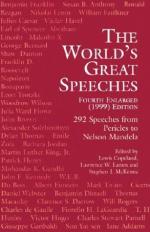
|
| Name: _________________________ | Period: ___________________ |
This test consists of 15 multiple choice questions and 5 short answer questions.
Multiple Choice Questions
1. Who was an English novelist that spoke about "English Friendship for America"?
(a) Julia Ward Howe.
(b) Charles Dickens.
(c) James Russell Lowell.
(d) Ralph Waldo Emerson.
2. Who was the director of the laboratories in Los Alamos, NM, where the atomic bomb was perfected?
(a) Walter Philip Reuther.
(b) J. Robert Oppenheimer.
(c) William Faulkner.
(d) Albert Einstein.
3. In the speech Dunkirk by Winston Churchill, which country was the aggressor?
(a) The United States.
(b) Japan.
(c) Russia.
(d) Germany.
4. Who worked hard to give New York a progressive, vital and constructive administration?
(a) John Vliet Lindsay.
(b) John William Gardner.
(c) George Wald.
(d) Richard Nixon.
5. According to Horace Porter, what was the woman's first home?
(a) The Garden of Eden.
(b) Africa.
(c) The kitchen.
(d) South America.
6. Where did the heads of the "Big Four" meet to discuss world problems "at the summit"?
(a) Geneva, Switzerland.
(b) Buenos Aires, Argentina.
(c) Paris, France.
(d) Rome, Italy.
7. According to Eisenhower, what was a continuing imperative with mutual honor and confidence?
(a) Disarmament.
(b) War.
(c) Hatred.
(d) Civil rights.
8. What was founded on the exploitation of the weaknesses of the human heart?
(a) Nazi propaganda.
(b) The U.S. Constitution.
(c) The Magna Carta.
(d) The Bill of Rights.
9. Who was a British playwright and novelist that delivered the speech "Literature and the Press"?
(a) Sir James Matthew Barrie.
(b) Irvin S. Cobb
(c) Lord Cecil.
(d) Lord Bacon.
10. Who was a lawyer and railroad executive that was known for his after-dinner speeches?
(a) Chauncy Mitchell Depew.
(b) Andrew Carnegie.
(c) Joseph Hodges Choate.
(d) George Graham Vest.
11. According to the speech "Powers of the President", what was the President responsible for?
(a) Administration of his office.
(b) Declaration of war.
(c) Occupation of other countries.
(d) Exploration of new territory.
12. What were solemn celebrations of the union of Christ and his church that led to the universal radiation of truth?
(a) Ecumenical Councils.
(b) Bishop Councils.
(c) Cardinal Councils.
(d) Papal Councils.
13. Who said "I think Music has the most mighty, universal, and immediate effect"?
(a) Edward Everett Hale.
(b) Carl Schurz.
(c) William Schwenck Gilbert.
(d) Sir Arthur Sullivan.
14. Who believed that the Canadian people entered WWII on their own free will?
(a) Anthony Eden.
(b) Clement R. Attlee.
(c) Winston Churchill.
(d) W.L. Mackenzie King.
15. What organization required a nuclear backdrop far beyond the capability of any Western European nation to supply?
(a) NAACP.
(b) United Nations.
(c) Peace Corps.
(d) NATO.
Short Answer Questions
1. Eisenhower stated that a common bind existed between a rice grower in Burma and a wheat planter of what U.S. state?
2. J.F.K. in his Inaugural address said man had the power to abolish all forms of human poverty and all forms of what?
3. Who was the leader and Presidential candidate for the socialist party for many years?
4. Who was a Democratic candidate for President in two consecutive elections, 1952 and 1956?
5. Who won the Nobel Prize for literature in 1949 and was one of the great American novelists in the 20th century?
|
This section contains 487 words (approx. 2 pages at 300 words per page) |

|




